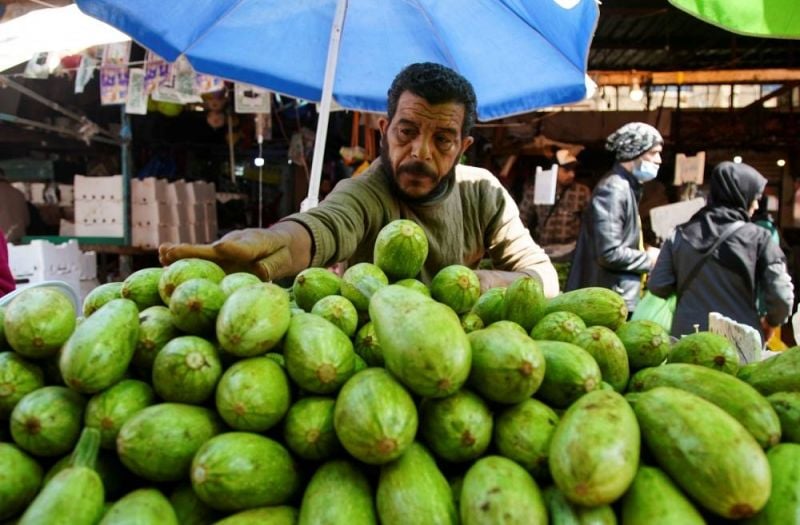
A vendor arranges his zucchini stock at a market in Beirut. Saudi Arabia’s ban on Lebanese produce could severely impact Lebanon’s agricultural sector. (Credit: Issam Abdallah/Reuters)
Want to get the Morning Brief by email? Click here to sign up.
A capital control draft law is ready for discussion within Parliament’s Finance and Budget Committee nearly a year and a half after the onset of the country’s worst financial crisis in decades. The draft law proposes capping monthly withdrawals at only LL20 million — about $1,590 at the current market exchange rate — as well as placing annual ceilings on dollar transfers. The capital controls, one of the prerequisites for unlocking sorely needed financial aid from the International Monetary Fund, would help limit the outflow of foreign currency funds from the country. The controls are one of several measures presently on the table to address Lebanon’s economic crisis. These measures also include the rollout of Sayrafa, the central bank’s new online exchange platform. The long-anticipated smartphone application, which was unveiled a week ago and will aim to establish an official parallel market exchange rate between the lira and foreign currencies, is set to launch next week, the BDL governor’s office announced on Wednesday.
Saudi Arabia’s produce ban, if prolonged, could have severe impacts on Lebanon’s already hard-hit agricultural sector, farmers and experts told L’Orient Today. “All forms of bad fortune are falling on the head of the Lebanese farmer at once,” Youssef Mahieddine, the head of Lebanon’s agricultural syndicates union, told L’Orient Today. Saudi officials attributed the ban to millions of illegal narcotics that were discovered in shipments from Lebanon between the beginning of 2020 and April. If the ban stretches deeper into the harvest season, Lebanon risks losing nearly a quarter of its agricultural export market for produce, which may have profound implications on large- and small-scale farmers alike.
The committee for the follow-up of preventive measures and procedures to confront COVID-19 recommended a ban on all travelers coming from India and Brazil. The ban, if implemented, will affect all travelers who have visited India and Brazil within 14 days of their scheduled arrival in Lebanon, the committee said in a statement. Caretaker Prime Minister Hassan Diab will now study the recommendation before making a final decision, Petra Khoury, a health official who sits on the committee, told L’Orient Today. Meanwhile, Parliament’s joint committees agreed Wednesday on a draft law to grant medical personnel who died fighting COVID-19 the same “martyr” status as fallen soldiers, health committee head Assem Araji wrote on Twitter. The status carries financial and medical benefits for the families of the deceased.
Meanwhile, Lebanon will enter a three-day total lockdown starting Saturday for the Orthodox Easter holiday. Despite a dip in daily cases and a decrease in the positivity rate of local PCR tests, officials have decided to implement the lockdown in an apparent attempt to stave off large gatherings that could lead to another spike in infections. Since Monday, Lebanon has recorded the lowest number of infections over a three-day period since the outbreak of the coronavirus that followed the Christmas and New Year holiday season.
The Morning Brief will be on hiatus over the holiday weekend. We will return on Tuesday, May 4, with everything you need to know for next week.